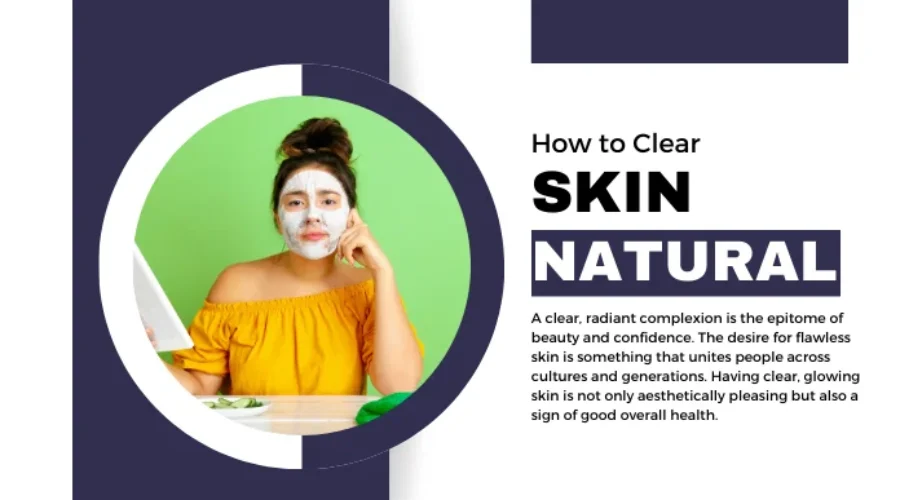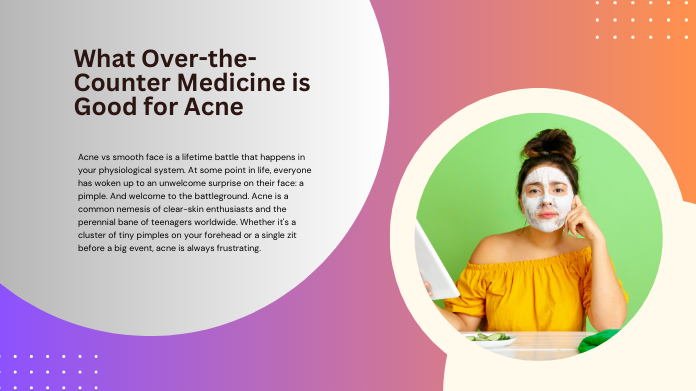How to Clear Skin Naturally
A clear, radiant complexion is the epitome of beauty and confidence. The desire for flawless skin is something that unites people across cultures and generations. Having clear, glowing skin is not only aesthetically pleasing but also a sign of good overall health. Many factors can influence the condition of our skin, including genetics, lifestyle choices, and skincare routines. Many skincare products promise magical results, but natural remedies and good skin care are the keys to clean skin.
In this guide, we will explore everything you need to know about clearing your skin naturally. We will delve into the basics of clear skin and explore effective natural remedies to achieve a healthy complexion.
Understanding the Basics of Clear Skin
Achieving clear skin starts with a solid understanding of its basic structure and function. Your skin is the largest organ of your body. It protects against environmental threats and regulates body temperature. To comprehend how to maintain clear skin, it’s essential to familiarize yourself with the three layers: the epidermis, dermis, and subcutaneous tissue.
Epidermis: The epidermis is the outermost layer, responsible for shielding you from external factors such as bacteria, UV radiation, and pollution. It has multiple sublayers and keratinocytes that create keratin, which gives your skin strength and suppleness.
Dermis: Beneath the epidermis is the dermis. It contains collagen and elastin fibers that sustain the elasticity of your skin. It also has blood arteries, hair follicles, sweat glands, and sebaceous glands that create sebum to nourish your skin.
Subcutaneous tissue: the subcutaneous tissue or hypodermis, which provides insulation and acts as a cushioning layer for underlying structures.
Now that we understand the basic structure of our skin, let’s delve into some fundamental concepts related to its physiology and maintenance. Here are key points to consider:
1. Skin Types: Recognizing your specific skin type (e.g., oily, dry, combination) allows you to tailor your skincare routine accordingly.
2. Skin Issues: Familiarize yourself with common skin conditions such as acne, blackheads, whiteheads, and blemishes that may affect your complexion.
3. Skin pH balance: Maintaining the ideal pH level of your skin helps prevent excessive dryness or oiliness.
4 Pillars of a Great Skincare Regimen
Establishing an effective skincare routine can significantly contribute to achieving clear and healthy skin. Consider incorporating the following pillars into your daily regime:
1. Wash Your Face Twice a Day

One of the foundational steps for clear skin is to cleanse your face thoroughly. This prevents the buildup of dirt, bacteria, and excess oils that can clog pores and lead to acne breakouts. Use a gentle cleanser suited for your skin type, and avoid harsh scrubbing, which can irritate the skin. Wash your face twice a day, in the morning and before bed, to keep it fresh and free from impurities.
2. Ensure Proper Hydration for Your Skin
Hydration plays a crucial role in maintaining clear and healthy skin. When your skin is dehydrated, it becomes prone to dryness and flakiness. Even oil production can increase as it compensates for the lack of moisture. Drink plenty of water throughout the day to keep your skin hydrated from within. Additionally, use a moisturizer that suits your skin type to prevent water loss and maintain its natural moisture balance.
3. Use Mild, Effective Cleansers and Moisturizers
Choosing the right products for your skincare routine is vital for achieving clear skin naturally. Opt for gentle cleansers that do not strip away the natural oils but effectively remove impurities. Avoid harsh ingredients like sulfates or fragrances that can irritate sensitive skin types.
In addition to cleansers, using an appropriate moisturizer is essential to lock in moisture, nourish your skin, and create a protective barrier against environmental pollutants.
4. Protect Your Skin from Harmful Sun Rays
UV rays are one of the most significant contributors to premature aging, pigmentation issues, and skin damage. To protect your skin from these harmful effects, make sunscreen an integral part of your daily routine. Choose broad-spectrum sunscreens with at least SPF 30 and apply it generously to all exposed areas. Reapply every two hours, especially when spending prolonged time outdoors.
Effective Home Remedies for Clear Skin
Achieving clear and radiant skin doesn’t have to involve expensive products. Nature provides us with a plethora of powerful ingredients that are effective home remedies for overall skin health. Incorporate these natural remedies into your skincare routine to maintain a healthy and glowing complexion:
Apple Cider Vinegar Toner
Mix equal parts of raw, unfiltered apple cider vinegar and water in a small bowl. Soak a cotton pad in the mixture and gently apply it to your cleansed skin using upward motions. Let it dry, then follow up with moisturizer. Apple cider vinegar helps balance the pH level of the skin, tighten pores, and reduce inflammation.
Turmeric Face Mask
In a small bowl, mix one teaspoon of turmeric powder with enough water or milk to form a paste. Apply the paste onto your face and let it sit for 15 minutes before rinsing off gently with lukewarm water. Turmeric has anti-inflammatory and antioxidant properties that soothe the skin, reduce redness, and promote a healthy glow.
Coconut Oil Moisturizer
Take a small amount of organic virgin coconut oil in your palm and warm it between your hands until it melts into an oil-like consistency. Gently massage the oil onto your entire body after bathing or showering. Leave it on overnight or rinse off after 30 minutes. Coconut oil contains natural antibacterial properties that hydrate and soothe the skin, leaving it soft and supple.
Green Tea Bath
Brew several green tea bags in hot water, then allow the tea to cool down before pouring it into your bathwater. Soak in the green tea-infused bath for 15-20 minutes to enjoy its antioxidant-rich benefits for your entire body’s skin. Green tea helps detoxify the skin, reduce inflammation, and promote a healthy glow.
Honey and Yogurt Face Mask
In a bowl, combine one tablespoon of raw honey with two tablespoons of plain yogurt until well blended. Apply the mixture to your clean face using clean fingers or a brush, avoiding the eye area. Leave it on for 15-20 minutes before rinsing off with lukewarm water. Honey moisturizes and nourishes the skin, while yogurt provides gentle exfoliation and helps to balance the skin’s pH levels.
Baking Soda Body Scrub
Mix three tablespoons of baking soda with enough water to create a thick paste. Gently massage the mixture onto damp skin in circular motions, focusing on rough areas such as elbows, knees, and heels. Rinse off thoroughly with warm water. Baking soda acts as a gentle exfoliant, removing dead skin cells and leaving your body feeling smooth and rejuvenated.
Aloe Vera Gel
Extract the gel from an Aloe Vera leaf and apply it directly to your clean face. Leave it on for 15-20 minutes before rinsing off with cool water. Aloe Vera contains antibacterial and anti-inflammatory properties that help reduce acne and calm irritated skin, leaving it feeling refreshed and rejuvenated.
Formulate a Skin-Healthy Diet
A healthy diet plays a crucial role in ensuring your skin looks its best from within. You can promote overall skin health by incorporating certain foods into your daily meals. Here’s how to formulate a skin-healthy diet:
Eat More Fruits and Vegetables
Fruits and vegetables are rich in essential vitamins, antioxidants, and minerals that nourish the skin from the inside out. Opt for a variety of colorful produce such as berries, citrus fruits, leafy greens, carrots, and bell peppers. These foods are packed with nutrients that help protect against free radical damage, promote collagen production, and keep your skin hydrated.
Limit Sugar and Fat Intake
Consuming excessive sugar and unhealthy fats can contribute to inflammation in the body, acne breakouts, and dull-looking skin. Reduce your intake of processed sugars found in sugary beverages, desserts, and refined snacks. Instead, choose natural sweeteners like honey or opt for fresh fruits as alternatives.
Similarly, limit your consumption of saturated fats in fried foods and fatty meats. Incorporate healthy fats from sources like avocados, nuts, seeds, and oily fish like salmon to provide the essential fatty acids required for maintaining healthy skin.
Incorporate Clear Skin Superfoods
Include specific superfoods known for their beneficial effects on the skin. Some examples include:
Berries: Rich in antioxidants that protect against environmental damage.
Omega-3 Fatty Acids: Found in fatty fish like salmon or flax seeds/chia seeds, help reduce inflammation.
Green Tea: Contains catechins that have anti-inflammatory properties.
Turmeric: Known for its anti-inflammatory properties; add it to dishes or consume it as a tea.
Probiotics: Found in fermented foods like yogurt or kefir, helps promote a healthy gut, which can translate to clear skin.
Connection Between Lifestyle and Skin Health
It’s no secret that our lifestyle choices can have a significant impact on the health of our skin. Here’s how your daily habits can affect your skin:
Hydration
Proper hydration is essential for maintaining healthy skin. When you don’t drink enough water, your skin can become dehydrated, leading to dryness, flakiness, and a dull complexion. Aim to drink at least eight glasses of water per day to keep your skin hydrated from the inside out.
Sleep
Getting quality sleep is vital for overall well-being, including skin health. During sleep, the body repairs itself, including its largest organ – the skin. Lack of proper sleep can break down collagen and elastin fibers in the skin, resulting in wrinkles, fine lines, and a tired appearance. Strive for at least 6 hours of uninterrupted sleep each night for rejuvenated and clear-looking skin.
Stress Management
Chronic stress releases hormones like cortisol that can negatively impact the skin by increasing oil production and inflammation. This may lead to acne breakouts or exacerbate existing conditions such as eczema or psoriasis.
Taking time for relaxation activities such as yoga, meditation, or engaging in hobbies can help manage stress levels and promote healthier-looking skin.
Physical Activity
Regular exercise not only benefits overall health but also improves blood circulation and promotes a healthy complexion. Exercise helps flush out toxins through sweat while delivering oxygen-rich blood to the skin cells, giving a natural glow. Aim for at least 30 minutes of moderate exercise most days of the week.
Sun Protection
Protecting your skin from harmful UV rays is crucial in maintaining clear and youthful-looking skin. Prolonged sun exposure without protection can lead to premature aging signs like wrinkles, age spots, and even skin cancer. Apply broad-spectrum sunscreen with at least SPF 30, wear protective clothes, and seek shade during peak hours to protect your skin.
Avoiding Smoking and Excessive Alcohol Consumption
Smoking damages collagen and elastin fibers, resulting in premature aging signs and a dull complexion. Similarly, excessive alcohol consumption can dehydrate the body and deprive the skin of vital nutrients. Reducing or eliminating smoking and consuming alcohol in moderation can greatly benefit your skin’s health.
Conclusion
We can naturally promote clear skin with a holistic approach. By incorporating these natural approaches into your daily life, you’ll nourish your skin from the inside out. Remember that consistency is key. It may take time for noticeable results to appear. With patience and a healthy lifestyle, you can achieve clear and glowing skin without relying heavily on artificial products.



